Impact of Stewardship and Governance on Organizational Performance
VerifiedAdded on 2022/09/18
|10
|3379
|16
Report
AI Summary
This report provides a comprehensive overview of stewardship and governance within organizations. It begins by introducing the concepts and their importance, emphasizing their role in protecting stakeholders and ensuring effective operations. The report then delves into three key theories of governance: evolutionary, agency, and stakeholder theory, explaining their relevance and impact. A significant portion is dedicated to stewardship theory, detailing its application in both profit and non-profit organizations, highlighting the roles of managers, and the importance of shareholder satisfaction. The report further explores the relationship between a leader's values and beliefs and effective governance, emphasizing the crucial role of leadership in achieving organizational goals, including accountability, integrity, and the ability to adapt to change. The report concludes by summarizing the key takeaways and reinforcing the significance of stewardship and governance for long-term organizational success.

Stewardship and governance
Paraphrase This Document
Need a fresh take? Get an instant paraphrase of this document with our AI Paraphraser
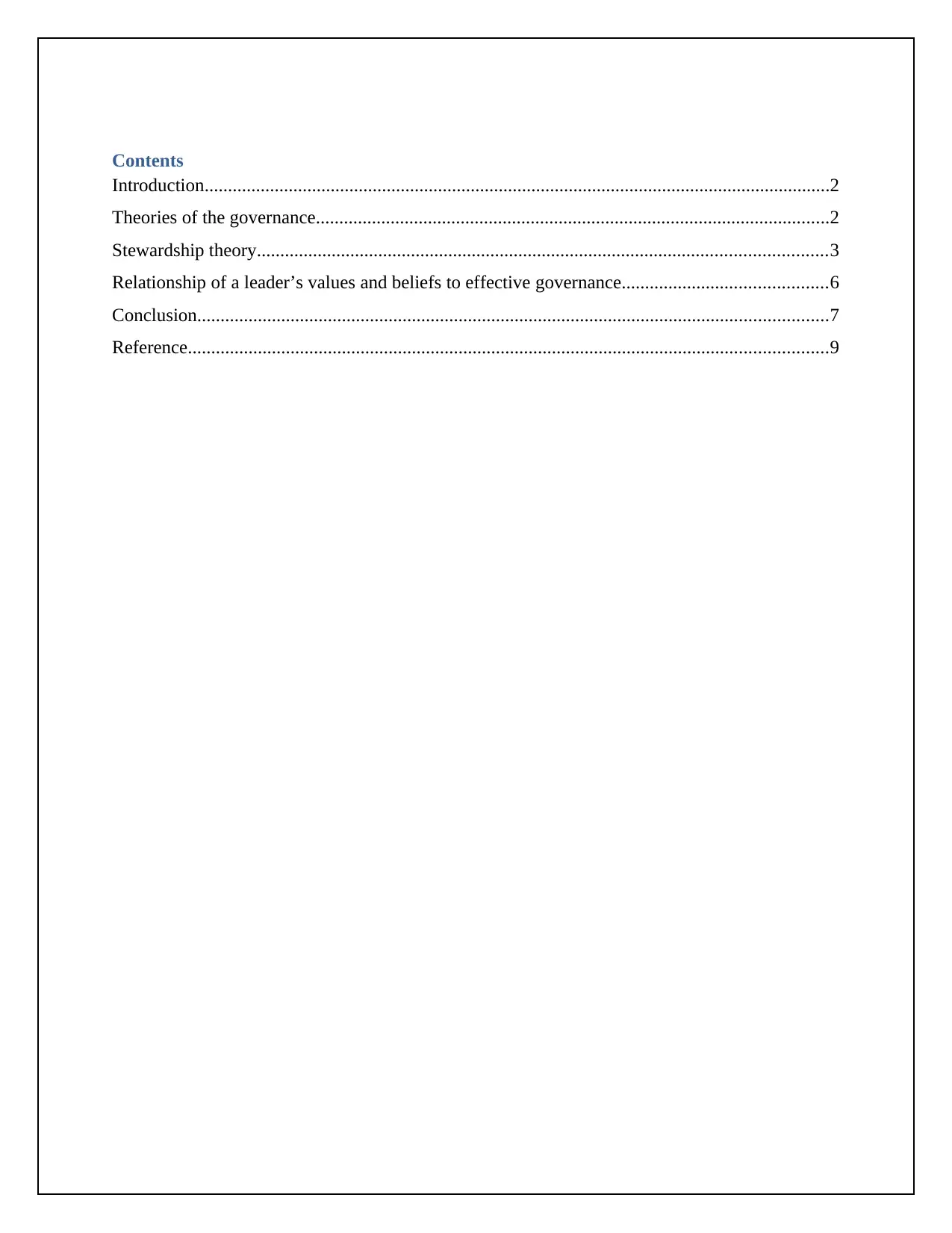
Contents
Introduction......................................................................................................................................2
Theories of the governance..............................................................................................................2
Stewardship theory..........................................................................................................................3
Relationship of a leader’s values and beliefs to effective governance............................................6
Conclusion.......................................................................................................................................7
Reference.........................................................................................................................................9
Introduction......................................................................................................................................2
Theories of the governance..............................................................................................................2
Stewardship theory..........................................................................................................................3
Relationship of a leader’s values and beliefs to effective governance............................................6
Conclusion.......................................................................................................................................7
Reference.........................................................................................................................................9
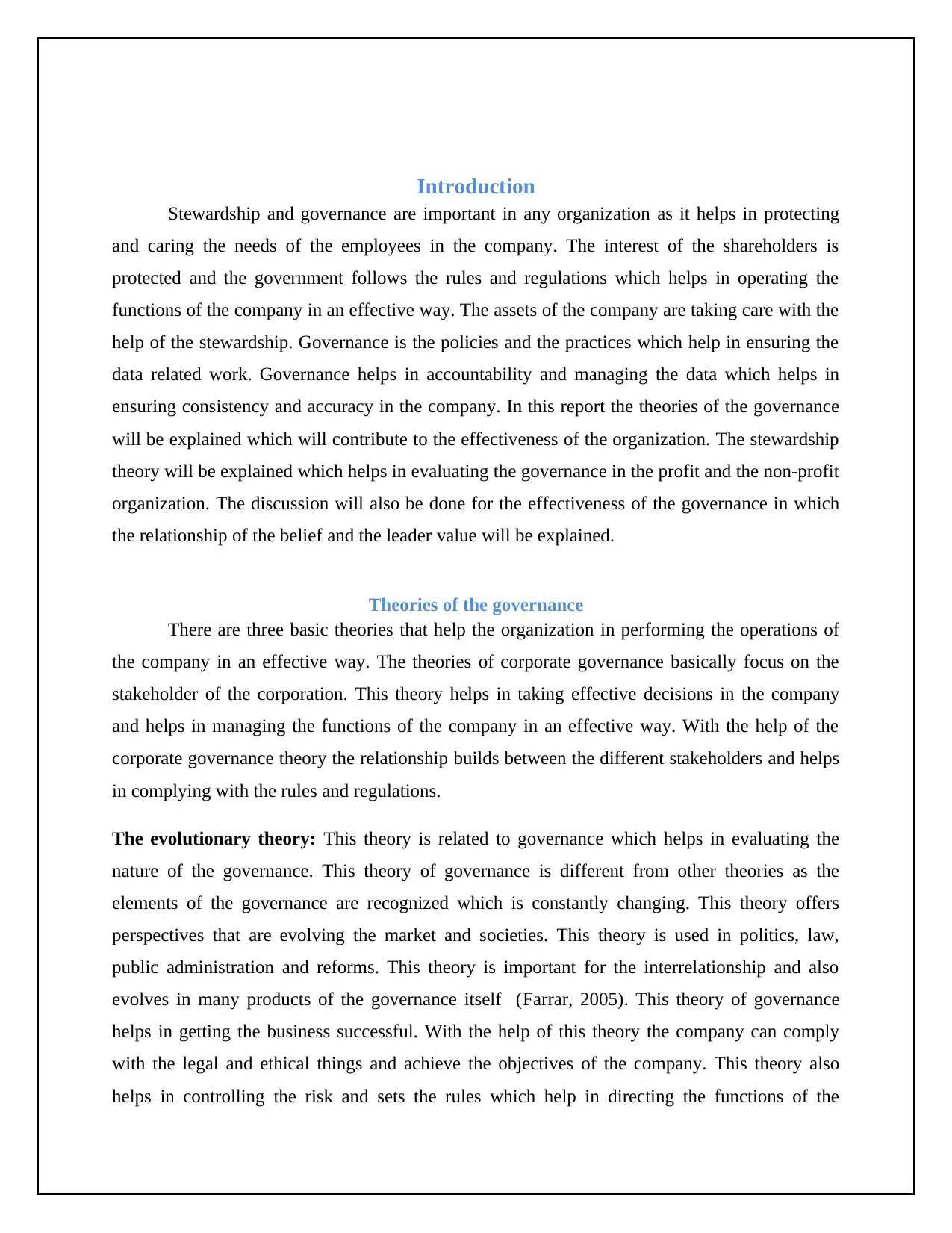
Introduction
Stewardship and governance are important in any organization as it helps in protecting
and caring the needs of the employees in the company. The interest of the shareholders is
protected and the government follows the rules and regulations which helps in operating the
functions of the company in an effective way. The assets of the company are taking care with the
help of the stewardship. Governance is the policies and the practices which help in ensuring the
data related work. Governance helps in accountability and managing the data which helps in
ensuring consistency and accuracy in the company. In this report the theories of the governance
will be explained which will contribute to the effectiveness of the organization. The stewardship
theory will be explained which helps in evaluating the governance in the profit and the non-profit
organization. The discussion will also be done for the effectiveness of the governance in which
the relationship of the belief and the leader value will be explained.
Theories of the governance
There are three basic theories that help the organization in performing the operations of
the company in an effective way. The theories of corporate governance basically focus on the
stakeholder of the corporation. This theory helps in taking effective decisions in the company
and helps in managing the functions of the company in an effective way. With the help of the
corporate governance theory the relationship builds between the different stakeholders and helps
in complying with the rules and regulations.
The evolutionary theory: This theory is related to governance which helps in evaluating the
nature of the governance. This theory of governance is different from other theories as the
elements of the governance are recognized which is constantly changing. This theory offers
perspectives that are evolving the market and societies. This theory is used in politics, law,
public administration and reforms. This theory is important for the interrelationship and also
evolves in many products of the governance itself (Farrar, 2005). This theory of governance
helps in getting the business successful. With the help of this theory the company can comply
with the legal and ethical things and achieve the objectives of the company. This theory also
helps in controlling the risk and sets the rules which help in directing the functions of the
Stewardship and governance are important in any organization as it helps in protecting
and caring the needs of the employees in the company. The interest of the shareholders is
protected and the government follows the rules and regulations which helps in operating the
functions of the company in an effective way. The assets of the company are taking care with the
help of the stewardship. Governance is the policies and the practices which help in ensuring the
data related work. Governance helps in accountability and managing the data which helps in
ensuring consistency and accuracy in the company. In this report the theories of the governance
will be explained which will contribute to the effectiveness of the organization. The stewardship
theory will be explained which helps in evaluating the governance in the profit and the non-profit
organization. The discussion will also be done for the effectiveness of the governance in which
the relationship of the belief and the leader value will be explained.
Theories of the governance
There are three basic theories that help the organization in performing the operations of
the company in an effective way. The theories of corporate governance basically focus on the
stakeholder of the corporation. This theory helps in taking effective decisions in the company
and helps in managing the functions of the company in an effective way. With the help of the
corporate governance theory the relationship builds between the different stakeholders and helps
in complying with the rules and regulations.
The evolutionary theory: This theory is related to governance which helps in evaluating the
nature of the governance. This theory of governance is different from other theories as the
elements of the governance are recognized which is constantly changing. This theory offers
perspectives that are evolving the market and societies. This theory is used in politics, law,
public administration and reforms. This theory is important for the interrelationship and also
evolves in many products of the governance itself (Farrar, 2005). This theory of governance
helps in getting the business successful. With the help of this theory the company can comply
with the legal and ethical things and achieve the objectives of the company. This theory also
helps in controlling the risk and sets the rules which help in directing the functions of the
⊘ This is a preview!⊘
Do you want full access?
Subscribe today to unlock all pages.

Trusted by 1+ million students worldwide
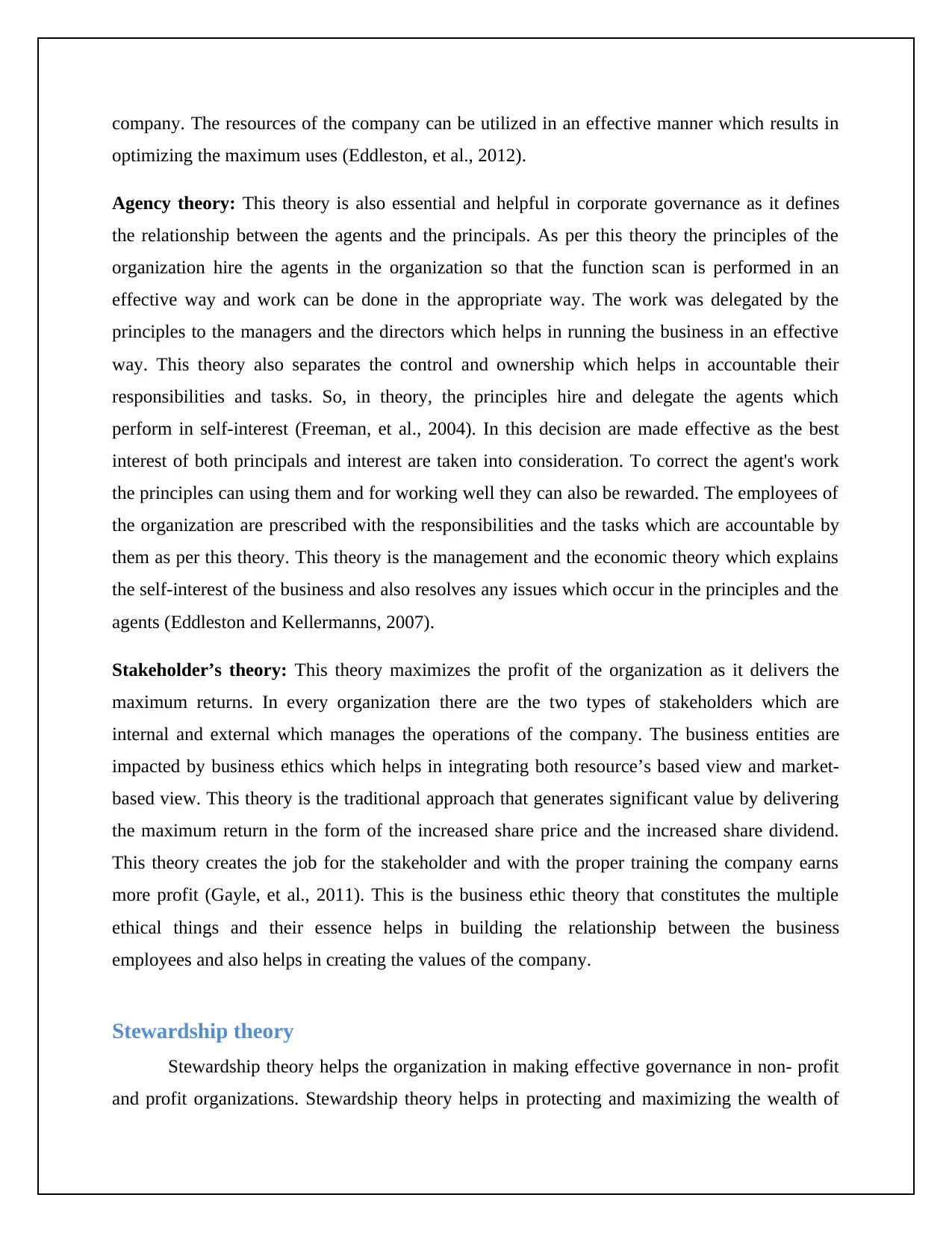
company. The resources of the company can be utilized in an effective manner which results in
optimizing the maximum uses (Eddleston, et al., 2012).
Agency theory: This theory is also essential and helpful in corporate governance as it defines
the relationship between the agents and the principals. As per this theory the principles of the
organization hire the agents in the organization so that the function scan is performed in an
effective way and work can be done in the appropriate way. The work was delegated by the
principles to the managers and the directors which helps in running the business in an effective
way. This theory also separates the control and ownership which helps in accountable their
responsibilities and tasks. So, in theory, the principles hire and delegate the agents which
perform in self-interest (Freeman, et al., 2004). In this decision are made effective as the best
interest of both principals and interest are taken into consideration. To correct the agent's work
the principles can using them and for working well they can also be rewarded. The employees of
the organization are prescribed with the responsibilities and the tasks which are accountable by
them as per this theory. This theory is the management and the economic theory which explains
the self-interest of the business and also resolves any issues which occur in the principles and the
agents (Eddleston and Kellermanns, 2007).
Stakeholder’s theory: This theory maximizes the profit of the organization as it delivers the
maximum returns. In every organization there are the two types of stakeholders which are
internal and external which manages the operations of the company. The business entities are
impacted by business ethics which helps in integrating both resource’s based view and market-
based view. This theory is the traditional approach that generates significant value by delivering
the maximum return in the form of the increased share price and the increased share dividend.
This theory creates the job for the stakeholder and with the proper training the company earns
more profit (Gayle, et al., 2011). This is the business ethic theory that constitutes the multiple
ethical things and their essence helps in building the relationship between the business
employees and also helps in creating the values of the company.
Stewardship theory
Stewardship theory helps the organization in making effective governance in non- profit
and profit organizations. Stewardship theory helps in protecting and maximizing the wealth of
optimizing the maximum uses (Eddleston, et al., 2012).
Agency theory: This theory is also essential and helpful in corporate governance as it defines
the relationship between the agents and the principals. As per this theory the principles of the
organization hire the agents in the organization so that the function scan is performed in an
effective way and work can be done in the appropriate way. The work was delegated by the
principles to the managers and the directors which helps in running the business in an effective
way. This theory also separates the control and ownership which helps in accountable their
responsibilities and tasks. So, in theory, the principles hire and delegate the agents which
perform in self-interest (Freeman, et al., 2004). In this decision are made effective as the best
interest of both principals and interest are taken into consideration. To correct the agent's work
the principles can using them and for working well they can also be rewarded. The employees of
the organization are prescribed with the responsibilities and the tasks which are accountable by
them as per this theory. This theory is the management and the economic theory which explains
the self-interest of the business and also resolves any issues which occur in the principles and the
agents (Eddleston and Kellermanns, 2007).
Stakeholder’s theory: This theory maximizes the profit of the organization as it delivers the
maximum returns. In every organization there are the two types of stakeholders which are
internal and external which manages the operations of the company. The business entities are
impacted by business ethics which helps in integrating both resource’s based view and market-
based view. This theory is the traditional approach that generates significant value by delivering
the maximum return in the form of the increased share price and the increased share dividend.
This theory creates the job for the stakeholder and with the proper training the company earns
more profit (Gayle, et al., 2011). This is the business ethic theory that constitutes the multiple
ethical things and their essence helps in building the relationship between the business
employees and also helps in creating the values of the company.
Stewardship theory
Stewardship theory helps the organization in making effective governance in non- profit
and profit organizations. Stewardship theory helps in protecting and maximizing the wealth of
Paraphrase This Document
Need a fresh take? Get an instant paraphrase of this document with our AI Paraphraser
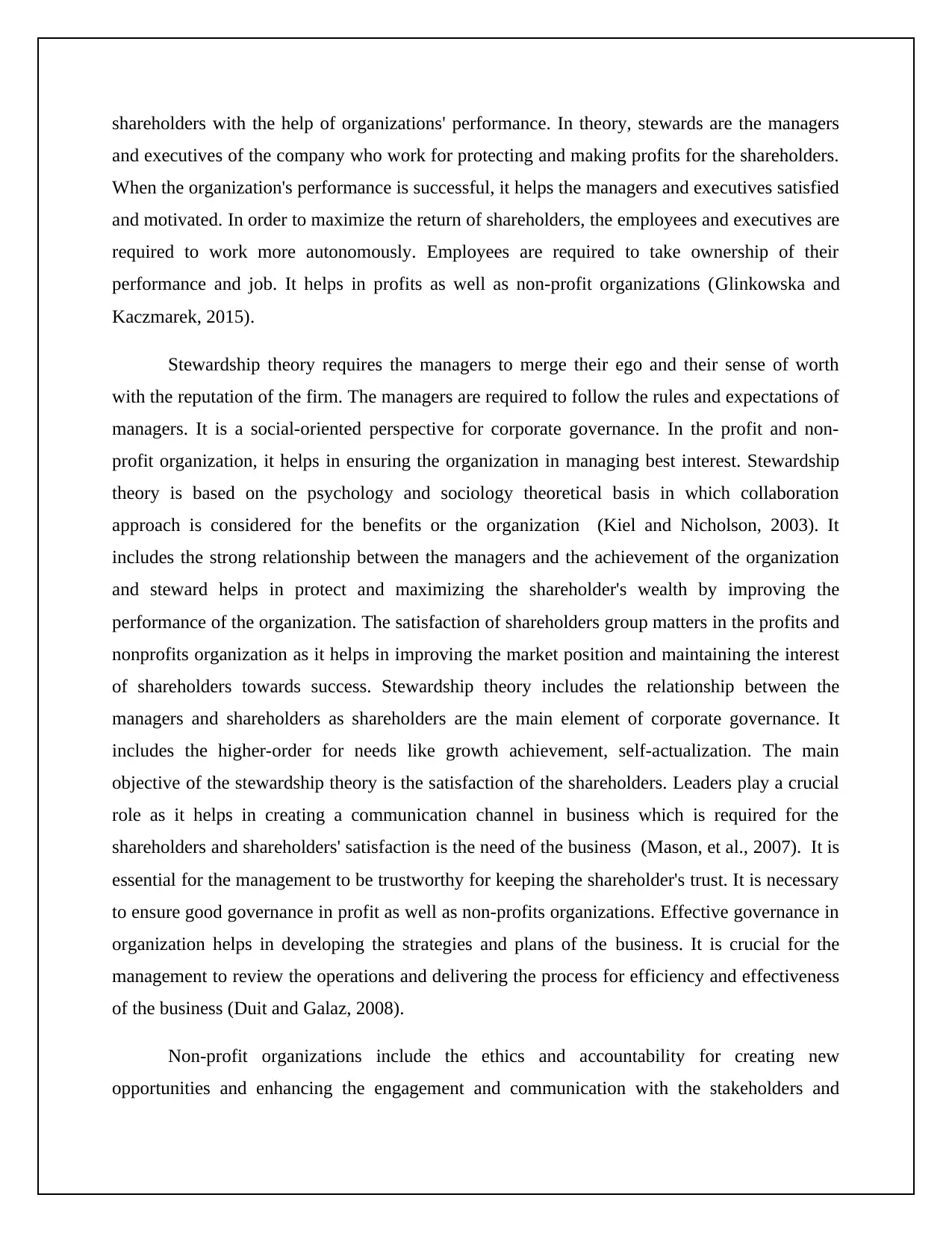
shareholders with the help of organizations' performance. In theory, stewards are the managers
and executives of the company who work for protecting and making profits for the shareholders.
When the organization's performance is successful, it helps the managers and executives satisfied
and motivated. In order to maximize the return of shareholders, the employees and executives are
required to work more autonomously. Employees are required to take ownership of their
performance and job. It helps in profits as well as non-profit organizations (Glinkowska and
Kaczmarek, 2015).
Stewardship theory requires the managers to merge their ego and their sense of worth
with the reputation of the firm. The managers are required to follow the rules and expectations of
managers. It is a social-oriented perspective for corporate governance. In the profit and non-
profit organization, it helps in ensuring the organization in managing best interest. Stewardship
theory is based on the psychology and sociology theoretical basis in which collaboration
approach is considered for the benefits or the organization (Kiel and Nicholson, 2003). It
includes the strong relationship between the managers and the achievement of the organization
and steward helps in protect and maximizing the shareholder's wealth by improving the
performance of the organization. The satisfaction of shareholders group matters in the profits and
nonprofits organization as it helps in improving the market position and maintaining the interest
of shareholders towards success. Stewardship theory includes the relationship between the
managers and shareholders as shareholders are the main element of corporate governance. It
includes the higher-order for needs like growth achievement, self-actualization. The main
objective of the stewardship theory is the satisfaction of the shareholders. Leaders play a crucial
role as it helps in creating a communication channel in business which is required for the
shareholders and shareholders' satisfaction is the need of the business (Mason, et al., 2007). It is
essential for the management to be trustworthy for keeping the shareholder's trust. It is necessary
to ensure good governance in profit as well as non-profits organizations. Effective governance in
organization helps in developing the strategies and plans of the business. It is crucial for the
management to review the operations and delivering the process for efficiency and effectiveness
of the business (Duit and Galaz, 2008).
Non-profit organizations include the ethics and accountability for creating new
opportunities and enhancing the engagement and communication with the stakeholders and
and executives of the company who work for protecting and making profits for the shareholders.
When the organization's performance is successful, it helps the managers and executives satisfied
and motivated. In order to maximize the return of shareholders, the employees and executives are
required to work more autonomously. Employees are required to take ownership of their
performance and job. It helps in profits as well as non-profit organizations (Glinkowska and
Kaczmarek, 2015).
Stewardship theory requires the managers to merge their ego and their sense of worth
with the reputation of the firm. The managers are required to follow the rules and expectations of
managers. It is a social-oriented perspective for corporate governance. In the profit and non-
profit organization, it helps in ensuring the organization in managing best interest. Stewardship
theory is based on the psychology and sociology theoretical basis in which collaboration
approach is considered for the benefits or the organization (Kiel and Nicholson, 2003). It
includes the strong relationship between the managers and the achievement of the organization
and steward helps in protect and maximizing the shareholder's wealth by improving the
performance of the organization. The satisfaction of shareholders group matters in the profits and
nonprofits organization as it helps in improving the market position and maintaining the interest
of shareholders towards success. Stewardship theory includes the relationship between the
managers and shareholders as shareholders are the main element of corporate governance. It
includes the higher-order for needs like growth achievement, self-actualization. The main
objective of the stewardship theory is the satisfaction of the shareholders. Leaders play a crucial
role as it helps in creating a communication channel in business which is required for the
shareholders and shareholders' satisfaction is the need of the business (Mason, et al., 2007). It is
essential for the management to be trustworthy for keeping the shareholder's trust. It is necessary
to ensure good governance in profit as well as non-profits organizations. Effective governance in
organization helps in developing the strategies and plans of the business. It is crucial for the
management to review the operations and delivering the process for efficiency and effectiveness
of the business (Duit and Galaz, 2008).
Non-profit organizations include the ethics and accountability for creating new
opportunities and enhancing the engagement and communication with the stakeholders and
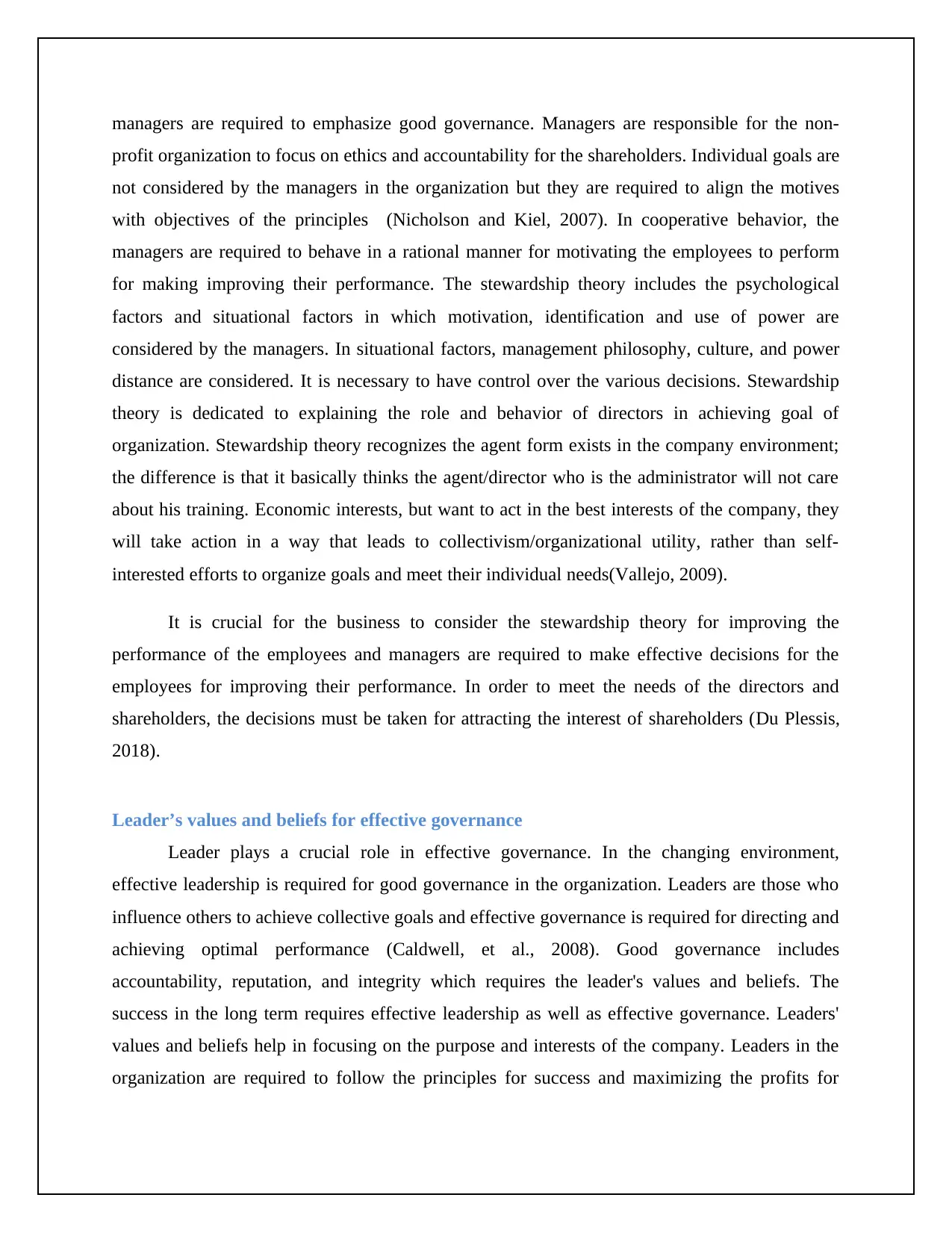
managers are required to emphasize good governance. Managers are responsible for the non-
profit organization to focus on ethics and accountability for the shareholders. Individual goals are
not considered by the managers in the organization but they are required to align the motives
with objectives of the principles (Nicholson and Kiel, 2007). In cooperative behavior, the
managers are required to behave in a rational manner for motivating the employees to perform
for making improving their performance. The stewardship theory includes the psychological
factors and situational factors in which motivation, identification and use of power are
considered by the managers. In situational factors, management philosophy, culture, and power
distance are considered. It is necessary to have control over the various decisions. Stewardship
theory is dedicated to explaining the role and behavior of directors in achieving goal of
organization. Stewardship theory recognizes the agent form exists in the company environment;
the difference is that it basically thinks the agent/director who is the administrator will not care
about his training. Economic interests, but want to act in the best interests of the company, they
will take action in a way that leads to collectivism/organizational utility, rather than self-
interested efforts to organize goals and meet their individual needs(Vallejo, 2009).
It is crucial for the business to consider the stewardship theory for improving the
performance of the employees and managers are required to make effective decisions for the
employees for improving their performance. In order to meet the needs of the directors and
shareholders, the decisions must be taken for attracting the interest of shareholders (Du Plessis,
2018).
Leader’s values and beliefs for effective governance
Leader plays a crucial role in effective governance. In the changing environment,
effective leadership is required for good governance in the organization. Leaders are those who
influence others to achieve collective goals and effective governance is required for directing and
achieving optimal performance (Caldwell, et al., 2008). Good governance includes
accountability, reputation, and integrity which requires the leader's values and beliefs. The
success in the long term requires effective leadership as well as effective governance. Leaders'
values and beliefs help in focusing on the purpose and interests of the company. Leaders in the
organization are required to follow the principles for success and maximizing the profits for
profit organization to focus on ethics and accountability for the shareholders. Individual goals are
not considered by the managers in the organization but they are required to align the motives
with objectives of the principles (Nicholson and Kiel, 2007). In cooperative behavior, the
managers are required to behave in a rational manner for motivating the employees to perform
for making improving their performance. The stewardship theory includes the psychological
factors and situational factors in which motivation, identification and use of power are
considered by the managers. In situational factors, management philosophy, culture, and power
distance are considered. It is necessary to have control over the various decisions. Stewardship
theory is dedicated to explaining the role and behavior of directors in achieving goal of
organization. Stewardship theory recognizes the agent form exists in the company environment;
the difference is that it basically thinks the agent/director who is the administrator will not care
about his training. Economic interests, but want to act in the best interests of the company, they
will take action in a way that leads to collectivism/organizational utility, rather than self-
interested efforts to organize goals and meet their individual needs(Vallejo, 2009).
It is crucial for the business to consider the stewardship theory for improving the
performance of the employees and managers are required to make effective decisions for the
employees for improving their performance. In order to meet the needs of the directors and
shareholders, the decisions must be taken for attracting the interest of shareholders (Du Plessis,
2018).
Leader’s values and beliefs for effective governance
Leader plays a crucial role in effective governance. In the changing environment,
effective leadership is required for good governance in the organization. Leaders are those who
influence others to achieve collective goals and effective governance is required for directing and
achieving optimal performance (Caldwell, et al., 2008). Good governance includes
accountability, reputation, and integrity which requires the leader's values and beliefs. The
success in the long term requires effective leadership as well as effective governance. Leaders'
values and beliefs help in focusing on the purpose and interests of the company. Leaders in the
organization are required to follow the principles for success and maximizing the profits for
⊘ This is a preview!⊘
Do you want full access?
Subscribe today to unlock all pages.

Trusted by 1+ million students worldwide
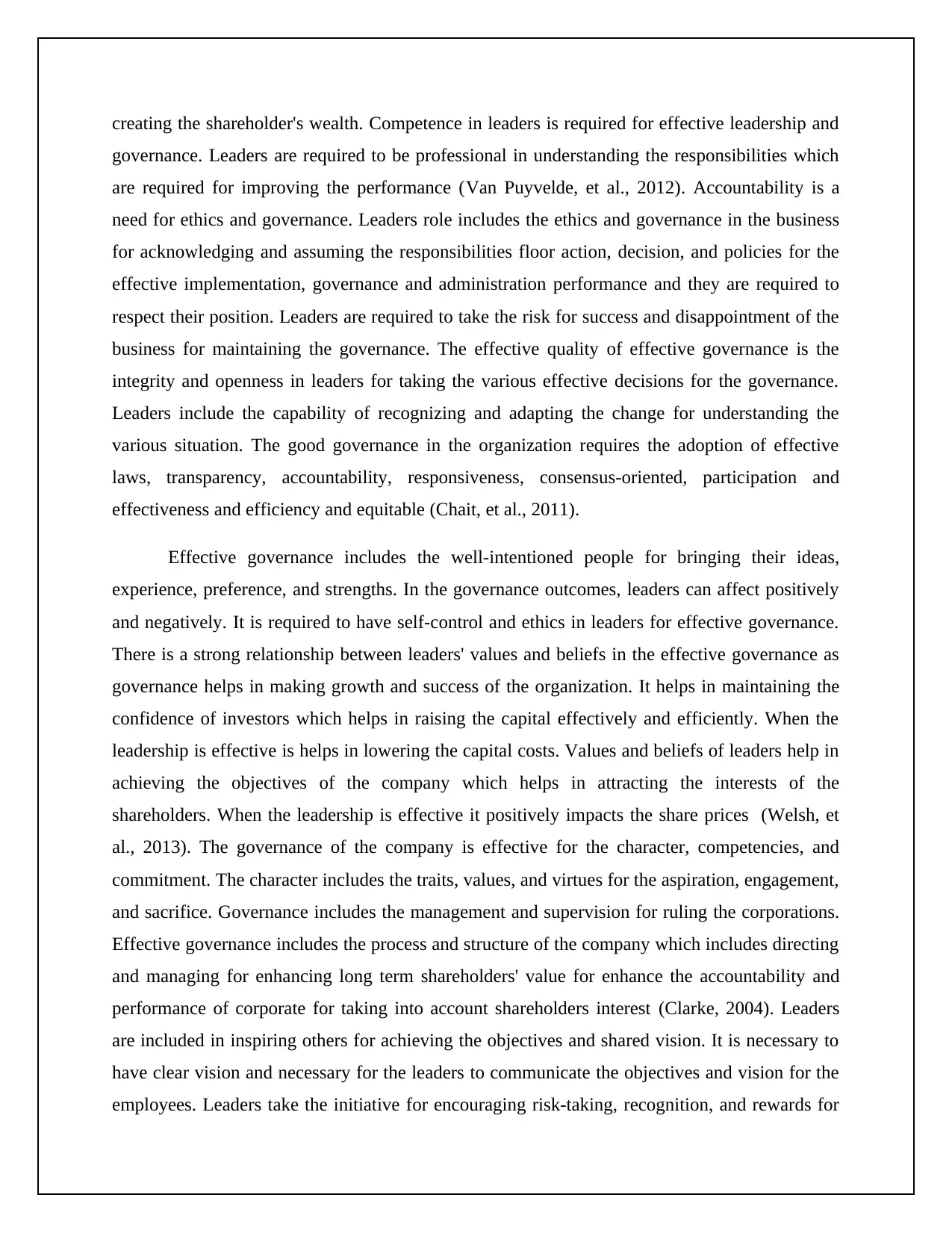
creating the shareholder's wealth. Competence in leaders is required for effective leadership and
governance. Leaders are required to be professional in understanding the responsibilities which
are required for improving the performance (Van Puyvelde, et al., 2012). Accountability is a
need for ethics and governance. Leaders role includes the ethics and governance in the business
for acknowledging and assuming the responsibilities floor action, decision, and policies for the
effective implementation, governance and administration performance and they are required to
respect their position. Leaders are required to take the risk for success and disappointment of the
business for maintaining the governance. The effective quality of effective governance is the
integrity and openness in leaders for taking the various effective decisions for the governance.
Leaders include the capability of recognizing and adapting the change for understanding the
various situation. The good governance in the organization requires the adoption of effective
laws, transparency, accountability, responsiveness, consensus-oriented, participation and
effectiveness and efficiency and equitable (Chait, et al., 2011).
Effective governance includes the well-intentioned people for bringing their ideas,
experience, preference, and strengths. In the governance outcomes, leaders can affect positively
and negatively. It is required to have self-control and ethics in leaders for effective governance.
There is a strong relationship between leaders' values and beliefs in the effective governance as
governance helps in making growth and success of the organization. It helps in maintaining the
confidence of investors which helps in raising the capital effectively and efficiently. When the
leadership is effective is helps in lowering the capital costs. Values and beliefs of leaders help in
achieving the objectives of the company which helps in attracting the interests of the
shareholders. When the leadership is effective it positively impacts the share prices (Welsh, et
al., 2013). The governance of the company is effective for the character, competencies, and
commitment. The character includes the traits, values, and virtues for the aspiration, engagement,
and sacrifice. Governance includes the management and supervision for ruling the corporations.
Effective governance includes the process and structure of the company which includes directing
and managing for enhancing long term shareholders' value for enhance the accountability and
performance of corporate for taking into account shareholders interest (Clarke, 2004). Leaders
are included in inspiring others for achieving the objectives and shared vision. It is necessary to
have clear vision and necessary for the leaders to communicate the objectives and vision for the
employees. Leaders take the initiative for encouraging risk-taking, recognition, and rewards for
governance. Leaders are required to be professional in understanding the responsibilities which
are required for improving the performance (Van Puyvelde, et al., 2012). Accountability is a
need for ethics and governance. Leaders role includes the ethics and governance in the business
for acknowledging and assuming the responsibilities floor action, decision, and policies for the
effective implementation, governance and administration performance and they are required to
respect their position. Leaders are required to take the risk for success and disappointment of the
business for maintaining the governance. The effective quality of effective governance is the
integrity and openness in leaders for taking the various effective decisions for the governance.
Leaders include the capability of recognizing and adapting the change for understanding the
various situation. The good governance in the organization requires the adoption of effective
laws, transparency, accountability, responsiveness, consensus-oriented, participation and
effectiveness and efficiency and equitable (Chait, et al., 2011).
Effective governance includes the well-intentioned people for bringing their ideas,
experience, preference, and strengths. In the governance outcomes, leaders can affect positively
and negatively. It is required to have self-control and ethics in leaders for effective governance.
There is a strong relationship between leaders' values and beliefs in the effective governance as
governance helps in making growth and success of the organization. It helps in maintaining the
confidence of investors which helps in raising the capital effectively and efficiently. When the
leadership is effective is helps in lowering the capital costs. Values and beliefs of leaders help in
achieving the objectives of the company which helps in attracting the interests of the
shareholders. When the leadership is effective it positively impacts the share prices (Welsh, et
al., 2013). The governance of the company is effective for the character, competencies, and
commitment. The character includes the traits, values, and virtues for the aspiration, engagement,
and sacrifice. Governance includes the management and supervision for ruling the corporations.
Effective governance includes the process and structure of the company which includes directing
and managing for enhancing long term shareholders' value for enhance the accountability and
performance of corporate for taking into account shareholders interest (Clarke, 2004). Leaders
are included in inspiring others for achieving the objectives and shared vision. It is necessary to
have clear vision and necessary for the leaders to communicate the objectives and vision for the
employees. Leaders take the initiative for encouraging risk-taking, recognition, and rewards for
Paraphrase This Document
Need a fresh take? Get an instant paraphrase of this document with our AI Paraphraser
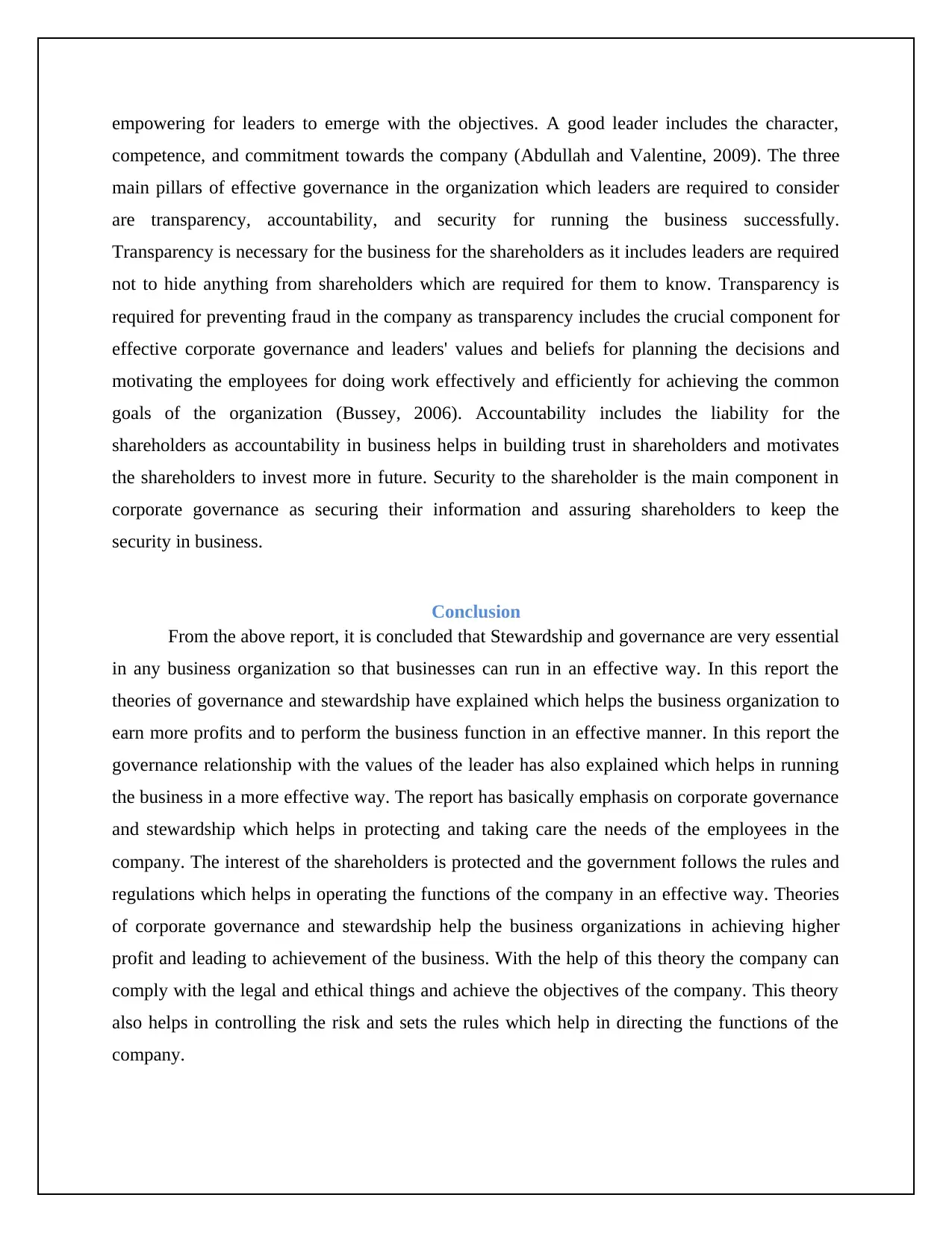
empowering for leaders to emerge with the objectives. A good leader includes the character,
competence, and commitment towards the company (Abdullah and Valentine, 2009). The three
main pillars of effective governance in the organization which leaders are required to consider
are transparency, accountability, and security for running the business successfully.
Transparency is necessary for the business for the shareholders as it includes leaders are required
not to hide anything from shareholders which are required for them to know. Transparency is
required for preventing fraud in the company as transparency includes the crucial component for
effective corporate governance and leaders' values and beliefs for planning the decisions and
motivating the employees for doing work effectively and efficiently for achieving the common
goals of the organization (Bussey, 2006). Accountability includes the liability for the
shareholders as accountability in business helps in building trust in shareholders and motivates
the shareholders to invest more in future. Security to the shareholder is the main component in
corporate governance as securing their information and assuring shareholders to keep the
security in business.
Conclusion
From the above report, it is concluded that Stewardship and governance are very essential
in any business organization so that businesses can run in an effective way. In this report the
theories of governance and stewardship have explained which helps the business organization to
earn more profits and to perform the business function in an effective manner. In this report the
governance relationship with the values of the leader has also explained which helps in running
the business in a more effective way. The report has basically emphasis on corporate governance
and stewardship which helps in protecting and taking care the needs of the employees in the
company. The interest of the shareholders is protected and the government follows the rules and
regulations which helps in operating the functions of the company in an effective way. Theories
of corporate governance and stewardship help the business organizations in achieving higher
profit and leading to achievement of the business. With the help of this theory the company can
comply with the legal and ethical things and achieve the objectives of the company. This theory
also helps in controlling the risk and sets the rules which help in directing the functions of the
company.
competence, and commitment towards the company (Abdullah and Valentine, 2009). The three
main pillars of effective governance in the organization which leaders are required to consider
are transparency, accountability, and security for running the business successfully.
Transparency is necessary for the business for the shareholders as it includes leaders are required
not to hide anything from shareholders which are required for them to know. Transparency is
required for preventing fraud in the company as transparency includes the crucial component for
effective corporate governance and leaders' values and beliefs for planning the decisions and
motivating the employees for doing work effectively and efficiently for achieving the common
goals of the organization (Bussey, 2006). Accountability includes the liability for the
shareholders as accountability in business helps in building trust in shareholders and motivates
the shareholders to invest more in future. Security to the shareholder is the main component in
corporate governance as securing their information and assuring shareholders to keep the
security in business.
Conclusion
From the above report, it is concluded that Stewardship and governance are very essential
in any business organization so that businesses can run in an effective way. In this report the
theories of governance and stewardship have explained which helps the business organization to
earn more profits and to perform the business function in an effective manner. In this report the
governance relationship with the values of the leader has also explained which helps in running
the business in a more effective way. The report has basically emphasis on corporate governance
and stewardship which helps in protecting and taking care the needs of the employees in the
company. The interest of the shareholders is protected and the government follows the rules and
regulations which helps in operating the functions of the company in an effective way. Theories
of corporate governance and stewardship help the business organizations in achieving higher
profit and leading to achievement of the business. With the help of this theory the company can
comply with the legal and ethical things and achieve the objectives of the company. This theory
also helps in controlling the risk and sets the rules which help in directing the functions of the
company.
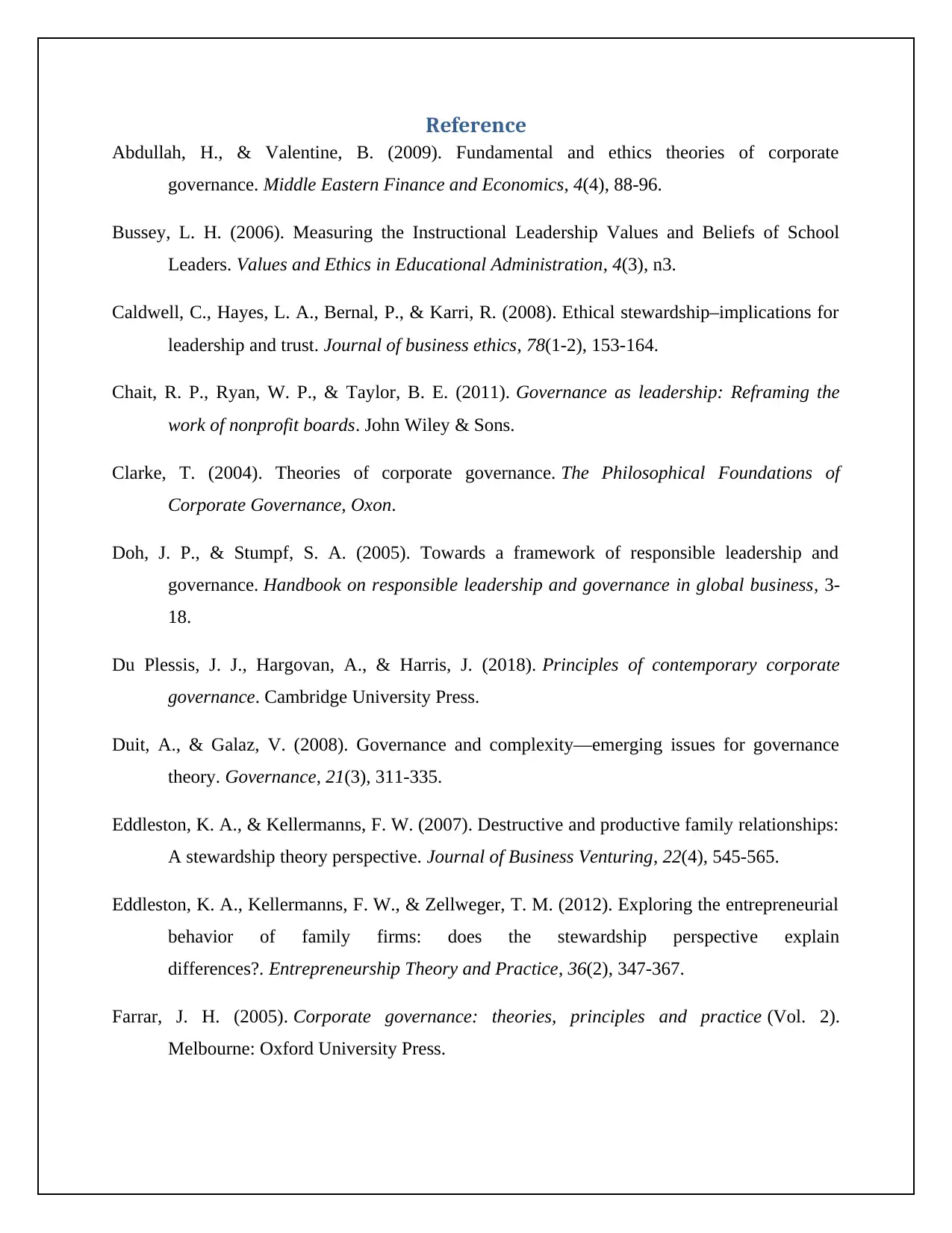
Reference
Abdullah, H., & Valentine, B. (2009). Fundamental and ethics theories of corporate
governance. Middle Eastern Finance and Economics, 4(4), 88-96.
Bussey, L. H. (2006). Measuring the Instructional Leadership Values and Beliefs of School
Leaders. Values and Ethics in Educational Administration, 4(3), n3.
Caldwell, C., Hayes, L. A., Bernal, P., & Karri, R. (2008). Ethical stewardship–implications for
leadership and trust. Journal of business ethics, 78(1-2), 153-164.
Chait, R. P., Ryan, W. P., & Taylor, B. E. (2011). Governance as leadership: Reframing the
work of nonprofit boards. John Wiley & Sons.
Clarke, T. (2004). Theories of corporate governance. The Philosophical Foundations of
Corporate Governance, Oxon.
Doh, J. P., & Stumpf, S. A. (2005). Towards a framework of responsible leadership and
governance. Handbook on responsible leadership and governance in global business, 3-
18.
Du Plessis, J. J., Hargovan, A., & Harris, J. (2018). Principles of contemporary corporate
governance. Cambridge University Press.
Duit, A., & Galaz, V. (2008). Governance and complexity—emerging issues for governance
theory. Governance, 21(3), 311-335.
Eddleston, K. A., & Kellermanns, F. W. (2007). Destructive and productive family relationships:
A stewardship theory perspective. Journal of Business Venturing, 22(4), 545-565.
Eddleston, K. A., Kellermanns, F. W., & Zellweger, T. M. (2012). Exploring the entrepreneurial
behavior of family firms: does the stewardship perspective explain
differences?. Entrepreneurship Theory and Practice, 36(2), 347-367.
Farrar, J. H. (2005). Corporate governance: theories, principles and practice (Vol. 2).
Melbourne: Oxford University Press.
Abdullah, H., & Valentine, B. (2009). Fundamental and ethics theories of corporate
governance. Middle Eastern Finance and Economics, 4(4), 88-96.
Bussey, L. H. (2006). Measuring the Instructional Leadership Values and Beliefs of School
Leaders. Values and Ethics in Educational Administration, 4(3), n3.
Caldwell, C., Hayes, L. A., Bernal, P., & Karri, R. (2008). Ethical stewardship–implications for
leadership and trust. Journal of business ethics, 78(1-2), 153-164.
Chait, R. P., Ryan, W. P., & Taylor, B. E. (2011). Governance as leadership: Reframing the
work of nonprofit boards. John Wiley & Sons.
Clarke, T. (2004). Theories of corporate governance. The Philosophical Foundations of
Corporate Governance, Oxon.
Doh, J. P., & Stumpf, S. A. (2005). Towards a framework of responsible leadership and
governance. Handbook on responsible leadership and governance in global business, 3-
18.
Du Plessis, J. J., Hargovan, A., & Harris, J. (2018). Principles of contemporary corporate
governance. Cambridge University Press.
Duit, A., & Galaz, V. (2008). Governance and complexity—emerging issues for governance
theory. Governance, 21(3), 311-335.
Eddleston, K. A., & Kellermanns, F. W. (2007). Destructive and productive family relationships:
A stewardship theory perspective. Journal of Business Venturing, 22(4), 545-565.
Eddleston, K. A., Kellermanns, F. W., & Zellweger, T. M. (2012). Exploring the entrepreneurial
behavior of family firms: does the stewardship perspective explain
differences?. Entrepreneurship Theory and Practice, 36(2), 347-367.
Farrar, J. H. (2005). Corporate governance: theories, principles and practice (Vol. 2).
Melbourne: Oxford University Press.
⊘ This is a preview!⊘
Do you want full access?
Subscribe today to unlock all pages.

Trusted by 1+ million students worldwide
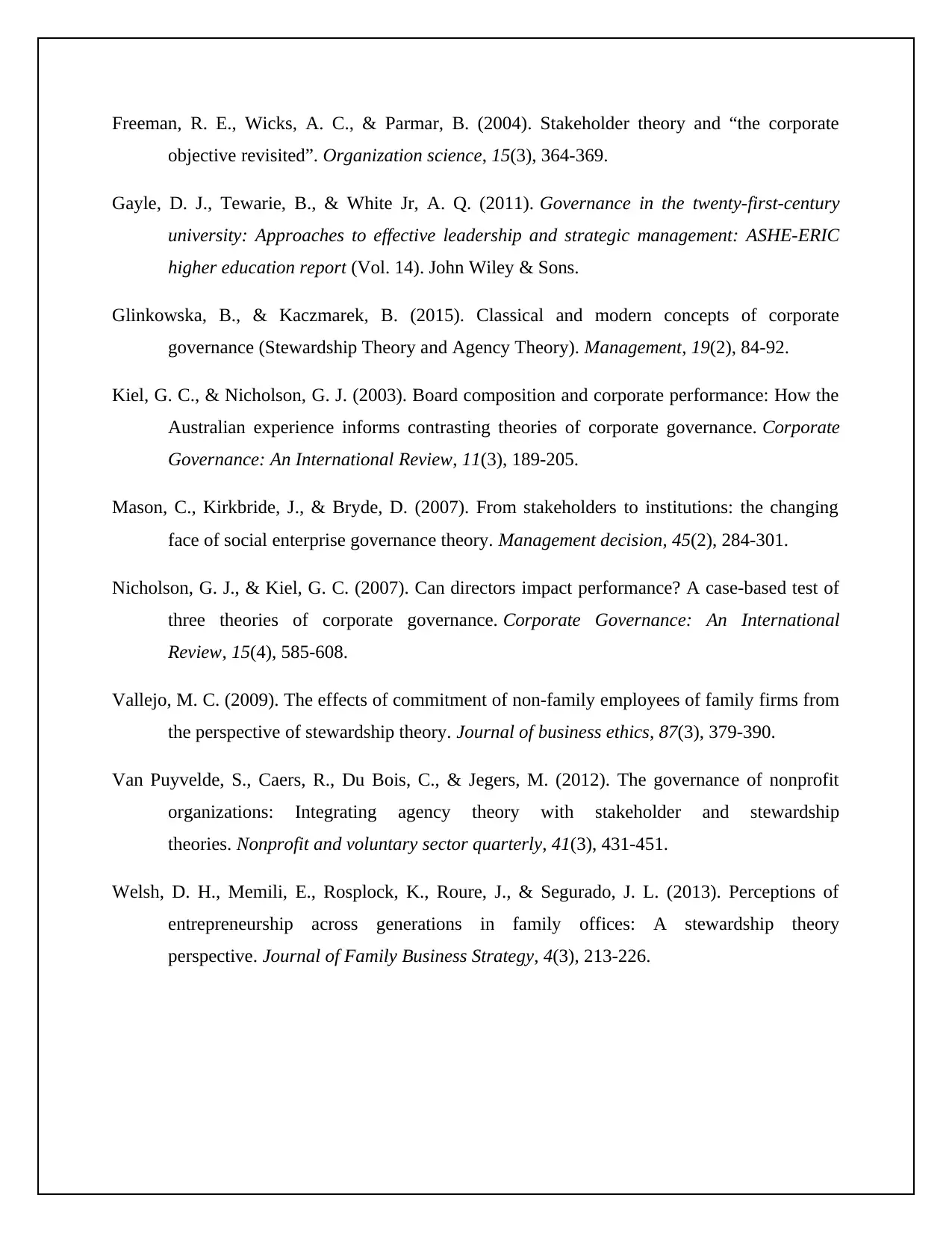
Freeman, R. E., Wicks, A. C., & Parmar, B. (2004). Stakeholder theory and “the corporate
objective revisited”. Organization science, 15(3), 364-369.
Gayle, D. J., Tewarie, B., & White Jr, A. Q. (2011). Governance in the twenty-first-century
university: Approaches to effective leadership and strategic management: ASHE-ERIC
higher education report (Vol. 14). John Wiley & Sons.
Glinkowska, B., & Kaczmarek, B. (2015). Classical and modern concepts of corporate
governance (Stewardship Theory and Agency Theory). Management, 19(2), 84-92.
Kiel, G. C., & Nicholson, G. J. (2003). Board composition and corporate performance: How the
Australian experience informs contrasting theories of corporate governance. Corporate
Governance: An International Review, 11(3), 189-205.
Mason, C., Kirkbride, J., & Bryde, D. (2007). From stakeholders to institutions: the changing
face of social enterprise governance theory. Management decision, 45(2), 284-301.
Nicholson, G. J., & Kiel, G. C. (2007). Can directors impact performance? A case‐based test of
three theories of corporate governance. Corporate Governance: An International
Review, 15(4), 585-608.
Vallejo, M. C. (2009). The effects of commitment of non-family employees of family firms from
the perspective of stewardship theory. Journal of business ethics, 87(3), 379-390.
Van Puyvelde, S., Caers, R., Du Bois, C., & Jegers, M. (2012). The governance of nonprofit
organizations: Integrating agency theory with stakeholder and stewardship
theories. Nonprofit and voluntary sector quarterly, 41(3), 431-451.
Welsh, D. H., Memili, E., Rosplock, K., Roure, J., & Segurado, J. L. (2013). Perceptions of
entrepreneurship across generations in family offices: A stewardship theory
perspective. Journal of Family Business Strategy, 4(3), 213-226.
objective revisited”. Organization science, 15(3), 364-369.
Gayle, D. J., Tewarie, B., & White Jr, A. Q. (2011). Governance in the twenty-first-century
university: Approaches to effective leadership and strategic management: ASHE-ERIC
higher education report (Vol. 14). John Wiley & Sons.
Glinkowska, B., & Kaczmarek, B. (2015). Classical and modern concepts of corporate
governance (Stewardship Theory and Agency Theory). Management, 19(2), 84-92.
Kiel, G. C., & Nicholson, G. J. (2003). Board composition and corporate performance: How the
Australian experience informs contrasting theories of corporate governance. Corporate
Governance: An International Review, 11(3), 189-205.
Mason, C., Kirkbride, J., & Bryde, D. (2007). From stakeholders to institutions: the changing
face of social enterprise governance theory. Management decision, 45(2), 284-301.
Nicholson, G. J., & Kiel, G. C. (2007). Can directors impact performance? A case‐based test of
three theories of corporate governance. Corporate Governance: An International
Review, 15(4), 585-608.
Vallejo, M. C. (2009). The effects of commitment of non-family employees of family firms from
the perspective of stewardship theory. Journal of business ethics, 87(3), 379-390.
Van Puyvelde, S., Caers, R., Du Bois, C., & Jegers, M. (2012). The governance of nonprofit
organizations: Integrating agency theory with stakeholder and stewardship
theories. Nonprofit and voluntary sector quarterly, 41(3), 431-451.
Welsh, D. H., Memili, E., Rosplock, K., Roure, J., & Segurado, J. L. (2013). Perceptions of
entrepreneurship across generations in family offices: A stewardship theory
perspective. Journal of Family Business Strategy, 4(3), 213-226.
1 out of 10
Related Documents
Your All-in-One AI-Powered Toolkit for Academic Success.
+13062052269
info@desklib.com
Available 24*7 on WhatsApp / Email
![[object Object]](/_next/static/media/star-bottom.7253800d.svg)
Unlock your academic potential
Copyright © 2020–2026 A2Z Services. All Rights Reserved. Developed and managed by ZUCOL.



